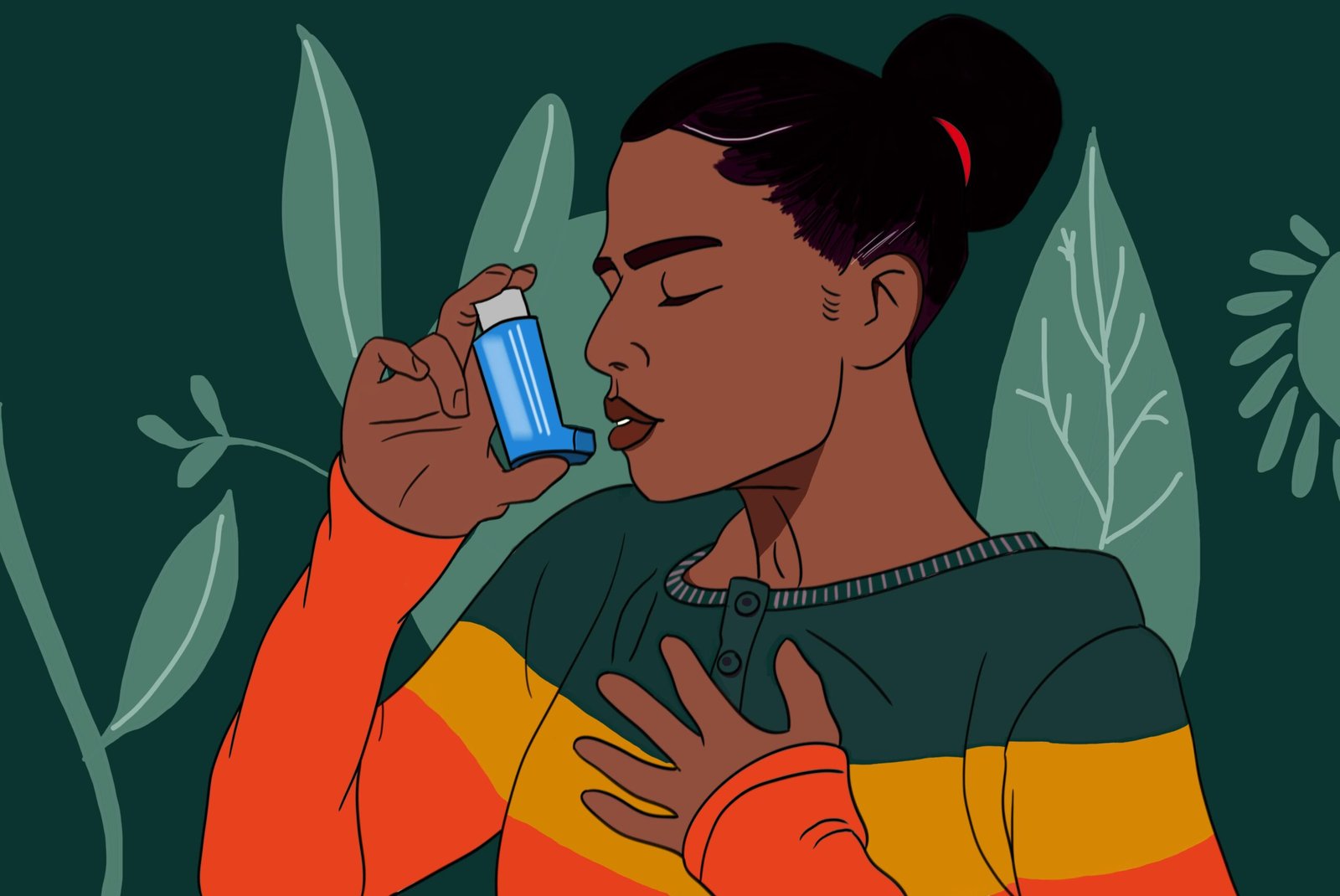🎧 Listen to: Asthma

Asthma
Introduction: How common is asthma in Africa?
Asthma is a common lung disease that affects how people breathe. In Africa, many people live with asthma without even knowing it, and this can be dangerous. According to the World Health Organization (WHO), about 300 million people worldwide suffer from asthma, with Ghana recording a country incidence rate of 1.5 cases per 1,000 people per year. The hot and dusty conditions in many parts of Africa, combined with pollution and household smoke, make asthma a serious issue that should not be ignored.
What is asthma?
Asthma is a condition that affects the airways, which are the tubes that carry air in and out of your lungs. When you have asthma, these airways become inflamed (swollen) and filled with mucus, making it difficult to breathe. The muscles around the airways can also tighten, which makes the problem even worse. This results in an asthma attack, where a person may struggle to breathe, cough, or wheeze (a whistling sound while breathing).
Symptoms of asthma?
Asthma symptoms can vary from person to person. Some people may experience mild symptoms, while others may have severe, life-threatening attacks. The most common symptoms include:
- Wheezing (a whistling sound when breathing)
- Frequent coughing (especially at night, after exercise, or when laughing)
- Tightness in the chest
- Shortness of breath
- Difficulty talking due to lack of air
- Feeling tired due to lack of oxygen
- Fast breathing
- Frequent respiratory infections (like colds that last longer than usual)
What causes asthma?
Asthma does not have a single known cause, but several factors increase the risk:
- Family history: If your parents or close relatives have asthma, you are more likely to develop it.
- Exposure to air pollution: Smoke from charcoal, wood fires, and car fumes can trigger asthma.
- The hygiene hypothesis: Some doctors believe that babies who are not exposed to enough germs in early life may develop asthma later because their immune systems become too sensitive.
Common asthma triggers in Africa?
Certain things can trigger (bring on) asthma symptoms. In Africa, these are some of the most common asthma triggers:
- Smoke from cooking fires and charcoal stoves
- Dusty environments
- Cold air or sudden weather changes
- Pollen and mold from trees and plants
- Household pests like cockroaches and dust mites
- Strong smells from perfumes or chemicals
- Respiratory infections (such as colds or flu)
- Intense emotions such as laughing or crying too hard
Misconceptions about asthma?
There are many myths about asthma that prevent people from seeking proper treatment. Some common ones include:
- “Asthma only affects children”. False! Many people develop asthma as adults.
- “You can outgrow asthma”. False! Asthma can go away for some time, but it often returns later.
- “Asthma is contagious”. False! You cannot catch asthma from someone else.
- “Herbal remedies can cure asthma”. False! While some natural remedies may help relieve symptoms, asthma has no cure and must be managed with proper medication.
How is asthma diagnosed?
There is no single test for asthma. Doctors use different methods to diagnose it:
- Medical history: Your doctor will ask about your symptoms and if anyone in your family has asthma.
- Physical examination: The doctor will listen to your breathing and check for allergic reactions.
- Breathing tests: These measure how well your lungs work. They are not common in children under 5 because they may not understand the instructions.
- Trial medication: If you or your child have asthma symptoms, the doctor may give asthma medicine to see if symptoms improve.
How is asthma treated?
Asthma cannot be cured, but it can be controlled with the right treatment. The best way to manage asthma is by avoiding triggers and using medication when needed.
Quick-relief (rescue) medications
These are used during an asthma attack to quickly open the airways:
- Bronchodilators: These are medicines that relax the muscles around the airways, allowing air to flow freely. They are taken through an inhaler (a small device that delivers medicine directly to the lungs).
Long-term control medications
These are taken daily to prevent asthma attacks:
- Anti-inflammatory medicines: Such as corticosteroids, which reduce swelling in the airways.
- Anticholinergics: These helps stop the airways from tightening and are often taken with anti-inflammatory medicines.
Lifestyle changes to manage asthma?
People with asthma can live normal lives if they take care of their health and avoid triggers. Some important lifestyle changes include:
- Avoid smoke and pollution: Stay away from cigarette smoke, cooking fires, and car fumes.
- Keep your home clean: Reduce dust, mold, and pests like cockroaches.
- Exercise wisely: Engage in light exercises like walking and swimming. Avoid overexertion.
- Eat a healthy diet: Foods rich in vitamins (like fruits and vegetables) help boost the immune system.
- Use your inhaler correctly: Always carry your inhaler and use it as prescribed by your doctor.
When to seek emergency help?
Asthma attacks can be life-threatening. Go to the hospital immediately if you or someone you know experiences:
- Severe shortness of breath that does not improve after using an inhaler
- Bluish lips or fingernails (signs of low oxygen)
- Inability to talk or walk due to breathlessness
- Feeling confused or dizzy
Conclusion: Why asthma awareness is important?
Asthma is a serious but manageable condition. Many people in Africa do not seek medical help because they think asthma is just a minor problem. However, untreated asthma can lead to severe complications and even death. If you or someone you know has frequent breathing difficulties, see a doctor immediately. With the right care, people with asthma can lead healthy and active lives.
Sources:
Ghana Medical Journal – Epidemiological Studies on Asthma in Ghana
World Health Organization (WHO) – Global Asthma Report
